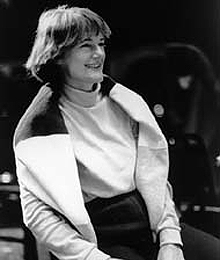By Bruce Duffie


| Emmy Award winning director
Sonja Frisell is widely regarded as one of the foremost stage directors
working today. Regularly engaged by the most important European and
American opera companies, Ms. Frisell has mounted productions for the
Metropolitan Opera, Lyric Opera of Chicago, San Francisco Opera, Covent
Garden in London, La Scala in Milan, Teatro Colon in Buenos Aires, Rio
de Janiero, La Fenice in Venice, Teatro Comunale in Bologna, Teatro
dell'Opera in Rome, Teatro Regio in Turin, Theatre de la Monnaie in
Brussels, Geneva Opera, Paris Opera, Bregenz Festival, Teatro Liceo in
Barcelona, Festival of Montepulciano, Houston Grand Opera, Washington
Opera, Seattle Opera, Canadian Opera Company, National Arts Centre in
Ottawa, Dallas Opera, Greater Miami Opera, Opera Company of
Philadelphia, Montreal Opera, Ottowa Opera, Calgary Opera, Edmonton
Opera, Tulsa Opera and Manitoba Opera. Recently Ms. Frisell directed a production of 'Salome' for Arizona Opera and will return to La Scala for 'L’occasione fa il ladro'. In previous seasons, Ms. Frisell has directed productions such as 'Don Carlo' in Chicago and Washington DC, 'La Gioconda' and 'La Cenerentola' at La Scala, 'Un ballo in maschera' in Bologna, 'Maometto II' and 'Khovanschina' in San Francisco, 'La forza del destino', 'Otello', and 'Die Zauberflöte' in Washington DC, 'Elena da Feltre' at the Wexford Festival, 'Turandot' in Trieste and Calgiari, 'Eugene Onegin' with the Arizona Opera, and 'L'italiana in Algieri' at Covent Garden, San Francisco, and in Verona. A protégé of famed director Jean-Pierre Ponnelle, Ms. Frisell received an Emmy Award in 1990 for the television broadcast of the Metropolitan Opera's production of 'Aida', a production that will be seen in the MET's High Definition cinema broadcasts in the fall of 2009 with Violeta Urmana, Dolora Zajick (also seen in the original Emmy-winning broadcast), Johan Botha, Giancarlo Guelfi, Roberto Scandiuzzi, and conducted by Daniele Gatti. -- Bio and photo from the CAMI
website
|
This interview was recorded on the telephone.
This
article was written early in 1987 for Nit
& Wit Magazine, but was never used due to tthe demise of the
publication. It was slightly re-edited and posted on this website
in 2012.
To see a full list (with links) of interviews which have been
transcribed and posted on this website, click here.
Award - winning broadcaster Bruce Duffie was with WNIB, Classical 97 in Chicago from 1975 until its final moment as a classical station in February of 2001. His interviews have also appeared in various magazines and journals since 1980, and he now continues his broadcast series on WNUR-FM, as well as on Contemporary Classical Internet Radio.
You are invited to visit his website for more information about his work, including selected transcripts of other interviews, plus a full list of his guests. He would also like to call your attention to the photos and information about his grandfather, who was a pioneer in the automotive field more than a century ago. You may also send him E-Mail with comments, questions and suggestions.